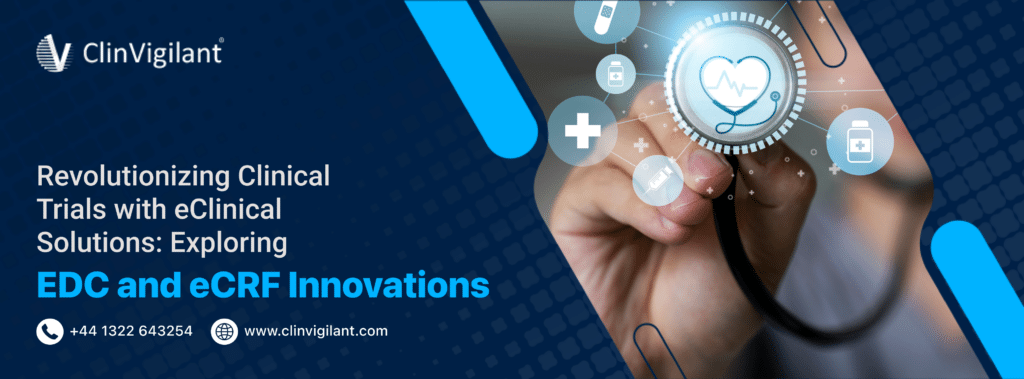
Clinical trials are integral to medical research, acting as the essential link between significant scientific breakthroughs and the final provision of secure and efficient treatments to patients across the globe. These trials serve as the pivotal platform where medical advancements are meticulously examined, improved upon, and eventually made accessible to those requiring help. As we explore the captivating realm of clinical research, it becomes apparent that substantial transformations, primarily ignited by revolutionary technological progress, have significantly shaped its landscape over time.
In our quest to delve into the influential potential of eClinical solutions in the domain of clinical trials, we direct our attention towards two revolutionary elements: Electronic Data Capture (EDC) and Electronic Case Report Forms (eCRF).
The Evolution of Clinical Trials
The fundamentals of clinical trials have roots extending for centuries; however, their progression into the modern era has been characterized by notable transformations, notably with the emergence of eClinical solutions. To grasp the importance of these advancements, a comprehensive understanding of the historical development of clinical trials is fundamental.
Historically, clinical trials involved utilizing conventional paper-based procedures, which posed various difficulties. Gathering and managing data required considerable effort, consumed a lot of time, and frequently resulted in errors. Researchers were dependent on handwritten notes, physical case report forms (CRFs), and an assortment of paper-based documents for documenting and recording each trial element. This approach proved to be both inefficient and susceptible to inconsistencies in data and transcription errors, potentially jeopardizing the reliability of research outcomes.
In the advent of the digital era, the clinical research sector initiated a transformation by adopting technology to enhance operational efficiency. This shift became a crucial milestone in the progression of clinical trials. Revolutionary advancements like Electronic Data Capture (EDC) and Electronic Case Report Forms (eCRF) emerged to tackle the inherent shortcomings of traditional paper-based practices.
eClinical Solutions Unveiled
What do eClinical Solutions entail?
eClinical solutions encompass an extensive range of digital instruments and advancements purposefully crafted to simplify and enrich different facets of clinical trials. These solutions exploit technology to boost the effectiveness, precision, and overall excellence of clinical research procedures. The term “eClinical” signifies the electronic conversion of traditionally paper-centric processes in clinical trials.
Key Components and Advantages
In the realm of eClinical solutions, there exists a diverse range of components, each meticulously designed to tackle distinct obstacles encountered in the clinical trial process. These constituents might comprise Electronic Data Capture (EDC) systems, Electronic Case Report Forms (eCRF), Clinical Trial Management Systems (CTMS), Randomization and Trial Supply Management (RTSM), as well as Electronic Patient-Reported Outcomes (ePRO), among several others.
The advantages of utilizing eClinical solutions are diverse and wide-ranging. They encompass the following:
- Improved Data Accuracy: The implementation of Electronic Data Capture (EDC) and electronic Case Report Form (eCRF) systems greatly decreases the likelihood of errors and discrepancies when entering data. Real-time validation checks play a pivotal role in ensuring the quality of data.
- Enhanced Efficiency: By streamlining processes and automating workflows, eClinical solutions effectively expedite trial timelines, starting from patient recruitment all the way to data analysis.
- Data Security: Robust data security measures are inherent in eClinical solutions, ensuring the protection of patient information and research data in accordance with regulatory standards.
- Remote Access: A key benefit is the ability for researchers and clinical staff to remotely access and input data. This feature facilitates collaboration and enables the execution of global clinical trials.
- Regulatory Compliance: eClinical solutions play a crucial role in upholding compliance with rigorous regulatory requirements. Moreover, they facilitate the creation of audit trails to ensure accountability.
The Importance of EDC in Clinical Trials
EDC, a crucial element of eClinical solutions, holds significant significance in contemporary clinical trials. EDC for clinical trials serves as a replacement for traditional paper-based data collection methods by providing digital platforms for investigators to electronically input, monitor, and manage clinical trial data.
The benefits of employing Electronic Data Capture (EDC) in clinical trials are commendable:
- Real-time Data Entry: EDC for clinical trials allows researchers to directly input data into electronic forms as they gather it, negating the need for manual transcription and decreasing the possibility of data entry mistakes.
- Data Validation: EDC systems incorporate built-in validation checks to ensure that data is comprehensive and accurate, thereby reducing the likelihood of discrepancies.
- Data Monitoring: With real-time data access and monitoring, potential issues can be promptly identified, facilitating timely corrective measures.
- Remote Access: Researchers can securely access and input data from different locations, facilitating the inclusion of geographically dispersed study sites and encouraging global collaboration.
Electronic Data Capture (EDC) for Clinical Trials
The Role of EDC in eClinical Solutions:
The technique of collecting data for clinical trials has undergone a significant transformation because to EDC, or electronic data capture. Serving as a fundamental component of eClinical solutions, EDC for clinical trials offers a digital alternative to traditional paper-based methods. These electronic platforms empower researchers to gather, oversee, and track clinical trial data more efficiently. The key objective of EDC is to facilitate the seamless, precise, and secure capture of data throughout all stages of a clinical trial.
Advantages of Electronic Data Capture (EDC):
- Enhanced Data Quality: EDC eliminates data transcription errors, incomplete data, and discrepancies through real-time data validation and automated checks. These functionalities improve data accuracy and integrity, ensuring reliable analysis and interpretation.
- Improved Efficiency: EDC for clinical trials simplifies data collection and management, reducing the time and effort invested in data collection, input, and cleansing. This streamlined process accelerates the overall clinical trial timeline, enabling faster results.
- Cost Reduction: By eliminating manual data entry, paper storage, and courier services, EDC for clinical trials significantly reduces expenses for both clinical trial sponsors and investigators. These cost savings can be redirected towards further enhancing research and development efforts.
- Data Accessibility: Real-time access to data empowers researchers to closely monitor trial progress, make well-informed decisions swiftly, and promptly address any issues or anomalies that arise. This immediate accessibility contributes to more efficient and effective trial management.
Electronic Case Report Forms (eCRF) in Clinical Trials
eCRF clinical trials are digital counterparts of conventional paper CRFs (Case Report Forms) utilized in clinical trials. Acting as organized and standardized templates, eCRFs enable the systematic collection and documentation of patient data, medical observations, and trial-related details. As integral elements of eClinical solutions, eCRFs hold significant importance in contemporary clinical research.
eCRF clinical trials are digital counterparts of conventional paper CRFs (Case Report Forms) utilized in clinical trials. Acting as organized and standardized templates, eCRFs enable the systematic collection and documentation of patient data, medical observations, and trial-related details. As integral elements of eClinical solutions, eCRFs hold significant importance in contemporary clinical research.
eCRFs versus Paper CRF:
eCRF clinical trials have distinct characteristics compared to paper CRFs as they are entirely digital. Unlike paper CRFs that require handwritten or typed entries on physical forms, eCRFs are filled out and stored electronically. This shift towards digital formats eradicates numerous hurdles associated with paper-based CRFs, including manual data entry mistakes, the potential for document misplacement, and slower data retrieval and analysis.
Customization and Flexibility:
eCRF clinical trials provide enhanced flexibility and customization choices in contrast to traditional paper-based forms. Scientists can personalize eCRFs according to the precise demands of a study by incorporating or altering fields as necessary. This adaptability enables clinical trials to effectively accommodate the intricate details of diverse research protocols.
Remote Data Entry and Monitoring:
eCRFs offer an exceptional capability to input and monitor data remotely. This means that clinical trial investigators and coordinators can conveniently enter data from various locations, thereby facilitating trials conducted at sites spread across different geographic regions. Remote data entry and monitoring not only streamline the clinical trial process but also enhance accessibility for both local and global trials.
Conclusion
The integration of eClinical solutions, specifically EDC and eCRF, marks a transformative phase in the realm of clinical trials. These innovations have paved the way for enhanced data quality, accelerated research timelines, and improved patient safety. As they become integral components of modern clinical research, it is clear that eClinical solutions are poised to shape the future of healthcare and medicine development. The path ahead is one of continued progress, greater efficiency, and, most importantly, the delivery of safer and more effective treatments to those who mainly rely on the outcomes of clinical trials. The future of clinical trials is indeed promising and illuminated by the digital advancements of eClinical solutions.

